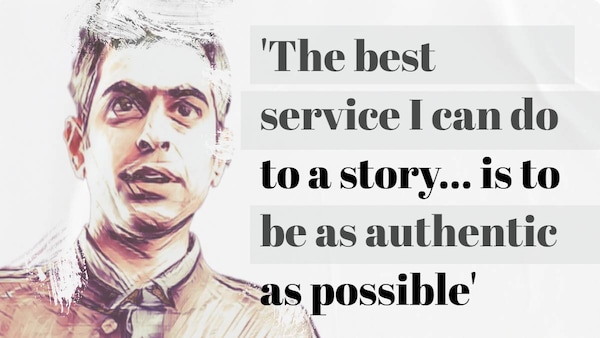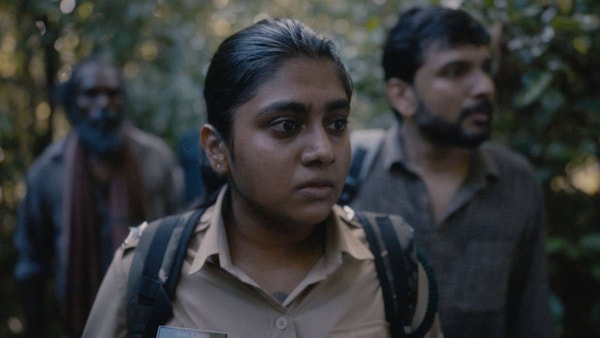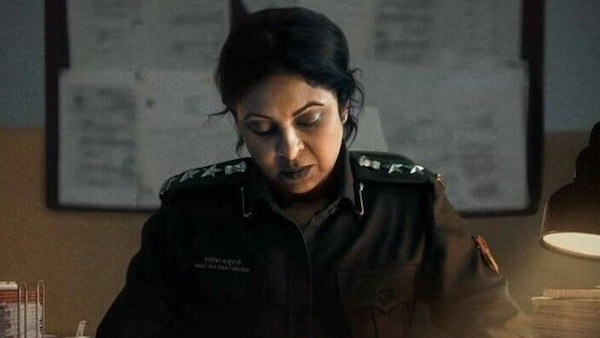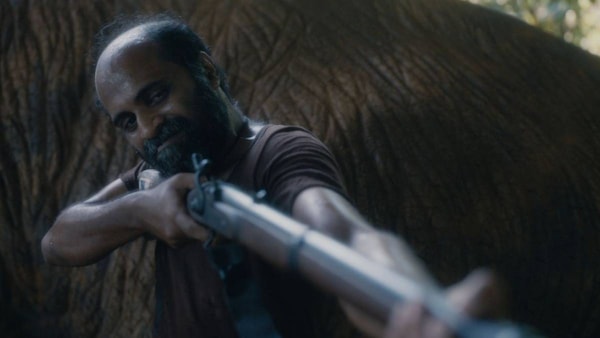The Richie Mehta Interview | 'I Feel, Ultimately, Human Beings Are Fairly Simple'
Filmmaker Richie Mehta talks to Ishita Sengupta about his fascination with procedural dramas, and how his works draw the line at glorifying power.

Last Updated: 12.49 PM, Apr 09, 2023
BACK IN 2019, filmmaker Richie Mehta altered the landscape of streaming with his show, Delhi Crime. The series centered on the 2012 Nirbhaya gang rape case that took place in the capital and shook the nation. Mehta retold the familiar story from the perspective of the officials. His slant was distinct but the intentionality with which it unfolded made the difference. What could have been a sleek procedural drama highlighting the deftness of the police officers ended up as an astute examination of a broken system. What should have been a postcard of bravery ended up as a portrait of unadorned efficiency displayed by a handful of police officers in the face of unfeasible means. Although Mehta did not helm the second season in 2022, he had already set an example of utilising long-form storytelling with compelling conviction. Delhi Crime won an International Emmy in 2020 for the Best Drama Series.
Earlier this year, the Canadian filmmaker headlined another show — Poacher. As the name suggests, it looks at the social malaise of poaching. Mehta, however, replicates his stance and frames the narrative around the police officers confronting such trafficking. The story is set in Kerala. The director's commitment to authenticity remains undeterred, evidenced in at-location shoots and choosing credible actors for characters like Dibyendu Bhattacharya for a Bengali cop based in Kerala, Roshan Mathew for a bilingual role, and Nimisha Sajayan for a local police officer..
The first three episodes premiered at the 2023 Sundance Film Festival, the same place where Delhi Crime was screened. The filmmaker spoke to me over Zoom, elaborating on his working style, tracing back to the germ of the idea and if his approach of unpacking a system runs the risk of valourising them. Excerpts.
Much like Delhi Crime, Poacher too is designed as an investigative thriller conveyed through the language of law and order. What is the fascination?
There are a couple of things. For one, I approach things circumstantially. In this case, I got to know about these wildlife crime fighters over time, and it was just a strange series of incidents that led me to them. And when I met them, I realised that these are the people who are on the frontlines of trying to protect the environment for us globally, and are risking their lives to do it. They just so happen to work in law enforcement.
The Allen character Roshan Mathew plays is not a law enforcement officer. He is working alongside law and is trying as a good Samaritan to participate. But the fact is, India has, what I believe, the best wildlife protection act in the world. And it also has the most diverse ecosystem in the world. When you combine those two things, it's pretty amazing what's happening in the subcontinent. But they're all at risk, because the population density is a problem. Crime is a problem. I think we need to examine how that system works. And that's what the series is, because as you can see, one of the biggest impediments for maintaining the law on behalf of wildlife are internal issues. There's laziness, there's corruption. The amount of work they're doing just to try and maintain integrity, so that they can do their jobs is amazing. It's really important to examine that as a society. Now, secondly, because of Sundance you have only seen just the three episodes. Where it goes from here is completely different from Delhi Crime.

How did you get interested in the outing?
I was doing this documentary India In A Day with Google in 2015 [a crowdsourced project in which British filmmaker Ridley Scott featured as a co-producer with Indian director Anurag Kashyap] , and people all over the country shot footage of their own lives and uploaded that footage to Google for me to edit into a documentary. That was October 10, 2015. And one of the pieces of footage I got amongst thousands was that of an ivory raid in Delhi, at a safe house with the forest department and NGO workers raiding it. I looked at the footage, and was shocked because it was a crime scene. I couldn't use it in the documentary. But I called the NGO and asked them about it. I told them I cannot use it but I will do a separate project on it because it is really fascinating.
After that, I started Delhi Crime. But as a reminder to myself to go back to the project, I put a scene in the first episode where Rasika Dugal's character finds tusks on a random traffic stop. After I finished Delhi Crime, I visited the NGO, Wildlife Trust of India, to pursue it further. I asked them about that raid day and they said, “We will connect you to our wildlife crime fighter.” That was the coolest job title I ever heard and I knew I had to meet this person.
When I contacted him, the person informed me that he was going undercover for six months but he could meet me for 10 minutes in Delhi at midnight. I met him, told him what I wanted to do — use storytelling to help his messaging. He seemed impressed and agreed to work with me. After the Delhi Crime shooting concluded, I spent a year travelling between Delhi and Kerala to find him. He was the Allen character. Through him I met all the officers, the real people I designed my characters on. I got familiar with the ecosystem too. This was 2019-2020. When the pandemic hit, I took all the year-long research I had and started writing.
When you look at a procedural drama, where do you draw the line between humanising and exalting or villainising them?
I draw the line this way: I feel ultimately human beings are fairly simple. Our motivations are very simple which can be distilled down to a handful of five, which we all share. So if you look at things through such a lens and look at somebody who, for example, botched a raid or screwed something up, chances are it was just laziness and not anything else. The probability is that. Obviously they could be corrupt; there are corrupt people all around. Even the series alludes to it but chances are things are quite simple. And within that, there is a lot of opportunity to explore complexities.
Yeah, there is a police officer in the show who gets suspended because of busting a raid. Later, we see him playing kabaddi. It was a telling touch of making a person out of a character.
Yeah, but you see there is nothing else to do, which is kind of silly. And kind of funny. I mean, what else are you going to do? It would have happened with any of us. I try to do this as much as I can in these types of procedurals so that it doesn't feel like we're watching superheroes. They are also normal people. And I think it's really important, especially as Indians that we realise that we're surrounded by people who really are trying to do the right thing. And they're normal people, very normal people, and when they have time off,from saving the world, they go and play kabaddi .

But in a country where instances of power being abused fill our newspapers every day, doesn't this approach also make you susceptible to defending them? Delhi Crime was criticised on this ground.
Of course. Look, I have spent enough time to experience the same thing you are talking about. But first of all, as a non-resident Indian I think it's unfair of me to come in and just purely criticise India, take a cheap shot and then go back to London. It is not right for me to do that. There are plenty of filmmakers and media doing it, justifiably. The narrative I am telling has not been told. See, if you have 500 films and 499 are talking about corruption, I think it is okay for one of them not to.
Secondly, I can vouch for those dozen officers in Delhi Crime who, I very strongly feel, did the right thing for those seven days. Especially the women. I cannot vouch for the organisation, nor do I ever claim to, which is why it takes place over seven days.
With this case, I can vouch for these four or five forest department officers. I spent enough time with them to know how good and decent these people are. And the NGO workers. That story is worth telling because, as you've rightly pointed out, if most of them are not like that, then the ones who are not, are worth identifying and inspiring us. Having said that, it is not like I am not acknowledging corruption. You have seen the first three episodes. Dibyendu's character spends a considerable time talking about internal corruption. Which means I am acknowledging that not only does it exist, it is a big issue. It just so happens that there are some good people who are trying to figure out a very flawed and broken system.

The casting is striking because Poacher has an assortment of diverse actors.
Honestly, I didn't even think about it. I just thought that the best service I can do, to this story, to the ideas I'm trying to communicate is to be as authentic as possible . The character that Dibynedu is based on is a Bengali who was stationed in Kerala. They have to adapt and bring their culture with them so they speak Bengali at home. But when they are out, they either speak in Hindi or English. Or, as you will see later he speaks bits of Malayalam because he has picked up the language. And that is true for all the characters. At the same time, the poachers, they're not speaking anything but the local dialect of Malayalam. I think it's very important that if this story doesn't make sense in Kerala, I've done a disservice. I don't speak a word of Malayalam and that's part of the challenge to make it look authentic. There's a lot of systems put in place to ensure that the dialogue is consistent with what I've written in English.
How did you go about the process?
I definitely wanted to cast actors from the cultures. I wanted a Bengali actor for Dibyendu's character, someone Malayali for Mala ( Nimisha Sajayan) and Allen's character. I had those ideas in mind but our casting director Mukesh and his team just nailed it. The first person he came up with was Nimisha Sajayan. I had not watched The Great Indian Kitchen, then I did. He had done the same thing with Shefali. He just came up with the name. We auditioned many people but Nimisha was just perfect for the role. Same with Roshan. I had not seen his work. He auditioned and he was amazing.
For me, it has to be the best people. I am directing a 370-page script. I need to sustain the believability of the project with the help of the actors.
How does a platform like Sundance help?
It's a new section, right, only six years old for showing series. With Delhi Crime it was very useful since that's how we found our distributor, Netflix. It was the same thing this time. It was made independently and the idea is to find a home through the screenings. It is also a rare privilege when you make a series and you get to screen it for the audience in a cinema. Otherwise, you are not there to witness people watching and reacting to it, collectively.

 Premium
Premium